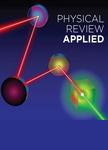版权所有:内蒙古大学图书馆 技术提供:维普资讯• 智图
内蒙古自治区呼和浩特市赛罕区大学西街235号 邮编: 010021

作者机构:Department of Physics and Astronomy University of Southern California Los Angeles California 90089 USA Center for Quantum Information Science and Technology University of Southern California Los Angeles California 90089 USA Institute for Quantum Studies Chapman University Orange California 92866 USA Berkeley Center for Quantum Information and Computation Berkeley California 94720 USA Department of Physics University of California Berkeley California 94720 USA Department of Chemistry University of California Berkeley California 94720 USA Peter Grünberg Institute of Quantum Control (PGI-8) Forschungszentrum Jülich GmbH Wilhelm-Johnen-Straße Jülich 52428 Germany Schmid College of Science and Technology Chapman University Orange California 92866 USA Ming Hsieh Department of Electrical and Computer Engineering University of Southern California Los Angeles California 90089 USA
出 版 物:《Physical Review Applied》 (Phys. Rev. Appl.)
年 卷 期:2024年第21卷第2期
页 面:024022-024022页
核心收录:
基 金:NSF-BSF, (1915015) Office of Naval Research, ONR, (27550, N00014-21-1-2688) Office of Naval Research, ONR Army Research Office, ARO State Key Laboratory of Palaeobiology and Stratigraphy, LPS, (W911NF-22-1-0258) State Key Laboratory of Palaeobiology and Stratigraphy, LPS
主 题:Measurement back action Optoelectronics Quantum control Quantum feedback Quantum information with solid state qubits Quantum measurements Superconducting qubits Microwave techniques
摘 要:We propose and analyze a protocol for stabilizing a maximally entangled state of two noninteracting qubits using active state-dependent feedback from a continuous two-qubit half-parity measurement in coordination with a concurrent, noncommuting dynamical decoupling drive. We demonstrate that such a drive can be simultaneous with the measurement and feedback, while also playing a key part in the feedback protocol itself. We show that robust stabilization with near-unit fidelity can be achieved even in the presence of realistic nonidealities, such as time delay in the feedback loop, imperfect state-tracking, inefficient measurements, dephasing from 1/f-distributed qubit-frequency noise, and relaxation. We mitigate feedback-delay error by introducing a forward-state-estimation strategy in the feedback controller that tracks the effects of control signals already in transit. More generally, the steady state is globally attractive without the need for ancillas, regardless of the error state, in contrast to most known feedback and error-correction schemes.